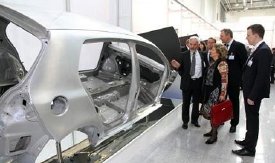The "SuperLIGHT-CAR" project and Hydro scientist Jürgen Hirsch were presented with a prestigious award at the InnoMateria conference and exhibition in Cologne, Germany, on March 15-16.
In the SuperLIGHT-CAR (SLC) project, co-funded by the European Commission, 38 leading organizations from nine European countries work together to bring lightweight automotive technologies closer to high-volume car production.
 Hydro scientist Jürgen Hirsch explains the main achievements of the SuperLIGHT-CAR project to Svenja Schulze, minister of Science and Innovation in Northrhine-Westfalia. The car body prototype was placed next to Hydro's exhibition stand at the InnoMateria in Cologne. (Photo: KoelnMesse)
Hydro scientist Jürgen Hirsch explains the main achievements of the SuperLIGHT-CAR project to Svenja Schulze, minister of Science and Innovation in Northrhine-Westfalia. The car body prototype was placed next to Hydro's exhibition stand at the InnoMateria in Cologne. (Photo: KoelnMesse)
Jürgen Hirsch, who is a senior scientist at Hydro's aluminium R&D center in Bonn, Germany, received the InnoMateria Award on behalf of the project partners. Hirsch has worked on the SLC project since it was established four years ago.
Based on the VW Golf, the SuperLIGHT-CAR project has carried out research on how the mix of materials used in all car component groups can be optimized to give a minimum 30 percent weight reduction, leading to savings in fuel consumption and CO2 emissions, yet representing an affordable cost for a daily serial production of more than 1,000 cars.
Hydro presented the SLC project at the InnoMateria and exhibited the car body prototype jointly developed in the project.
Aluminium's share in the prototype car body was increased to 64 percent of the overall volume. "In a fair competition for the best solutions possible for the SLC, aluminium came out as the clear winner," Hirsch said.
"Carbon materials, which are talked about a lot these days, lag behind aluminium significantly in the long run. At the end of their life, carbon materials have to be burned, and what remains is of minor quality and can only add little to a future carbon part," he said and pointed to the fact that aluminium parts can be recycled again an again by using only 5 percent of the energy needed to produce the primary metal.
Hydro ranks among the leading suppliers of aluminium semis for the light-weight construction of vehicles, in private cars and for transportation, from train to ships.
For car body parts, the fastest-growing aluminium segment in the automotive sector, Hydro has developed a special sheet alloy, providing an increased elongation for better forming. For the production of this sheet alloy, Hydro's automotive center in Grevenbroich, Germany, has been expanded by a €20 million annealing line.